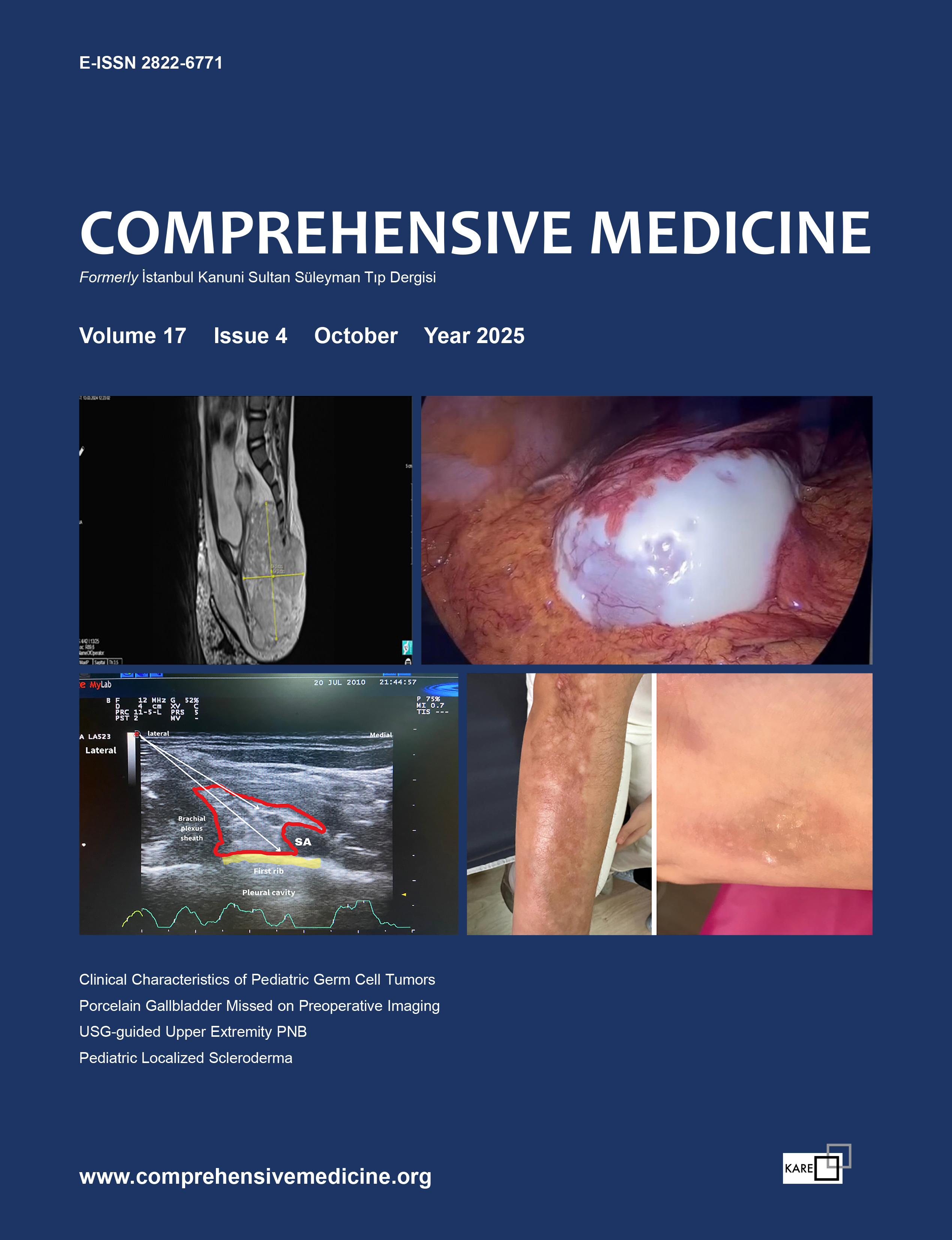Seroprevalence of Toxoplasma Gondii In Pregnant Women in Attending a Private Hospital in İstanbul
Salih Yılmaz1, Nura Fitnat Topbaş Selçuki2, Gizem Nil Ceylan3, İlknur Sayar4, Taner Usta51Department of Gynecology and Obstetrics, Acıbadem Altunizade Hospital, İstanbul, Türkiye2Department of Gynecology and Obstetrics, University of Health Sciences, Şişli Hamidiye Etfal Training and Research Hospital, İstanbul, Türkiye
3Department of Gynecology and Obstetrics, Medeniyet University, Göztepe Training and Research Hospital, İstanbul, Türkiye
4Department of Gynecology and Obstetrics, VM Medikalpark Pendik Hospital, İstanbul, Türkiye
5Department of Gynecology and Obstetrics, Mehmet Ali Aydinlar Acıbadem University, Acıbadem Altunizade Hospital, İstanbul, Türkiye
INTRODUCTION: Toxoplasmosis is a zoonotic infection caused by Toxoplasma gondii (T. gondii), an obligate intracellular parasite. Toxoplasmosis can be dangerous for pregnant women in terms of ‘Congenital Toxoplasmosis’. This condition may cause spontaneous abortion, foetal death, intrauterine growth retardation, hydrocephalus, neurological, ocular or auditory problems or cardiovascular diseases. The aim of this study was to determine the seroprevalence of T. gondii IgM and IgG in pregnant women and to compare it with studies conducted in Türkiye.
METHODS: Pregnant women between the ages of 18-50 years who applied to our outpatient clinic between 2017 and 2022 and who had T. gondii IgM and IgG results from blood samples in the first trimester were included. Anti-T. gondii IgM and IgG antibodies were analysed in sera of the patients.
RESULTS: Of the 2056 pregnant women included in the study, 2033 (98.9%) were IgM negative and 23 (1.1%) were IgM positive. IgG was negative in 1686 (82%) and IgG positive in 370 (18%) of 2056 pregnant women. 1671 pregnant women were both IgM and IgG negative, 362 pregnant women were IgM negative but IgG positive, 15 pregnant women were IgM positive but IgG negative and 8 pregnant women were both IgM and IgG positive.
DISCUSSION AND CONCLUSION: The number of foetuses affected by toxoplasmosis can be reduced by determining the seroprevelance of toxoplasmosis in countries with different regions and lifestyles such as our country, screening pregnant women in regions with low rates such as the population admitted to our hospital for toxoplasmosis and informing pregnant women at risk about toxoplasmosis.
İstanbul'da Özel Bir Hastaneye Başvuran Gebelerde Toksoplazma Gondii Seroprevelansı
Salih Yılmaz1, Nura Fitnat Topbaş Selçuki2, Gizem Nil Ceylan3, İlknur Sayar4, Taner Usta51Acıbadem Altunizade Hastanesi, Kadın Hastalıkları ve Doğum Kliniği2Sağlık Bilimleri Üniversitesi Şişli Hamidiye Etfal Eğitim ve Araştırma Hastanesi, Kadın Hastalıkları ve Doğum Kliniği
3Medeniyet Üniversitesi Göztepe Eğitim ve Araştırma Hastanesi, Kadın Hastalıkları ve Doğum Kliniği
4VM Medikalpark Pendik Hastanesi, Kadın Hastalıkları ve Doğum Kliniği
5Mehmet Ali Aydınlar Acıbadem Üniversitesi Acıbadem Altunizade Hastanesi, Kadın Hastalıkları ve Doğum Kliniği
GİRİŞ ve AMAÇ: Toksoplazmozis; zorunlu hücre içi paraziti olan Toxoplasma gondii’nin (T. gondii) etken olduğu zoonotik bir enfeksiyondur. Toksoplazmozis 'Konjenital Toksoplazmozis' açısından gebeler için tehlikeli bir tablo olabilir. Bu durum, spontan düşük, fetal ölüm, intrauterin büyüme geriliği, hidrosefali, ensefalit, nörolojik, oküler veya işitsel problemlere veya kardiyovasküler hastalıklara neden olabilir. Bu çalışmanın amacı polikliniğimize beş yıllık süre zarfında başvurmuş gebelerde T. gondii IgM ve IgG seroprevalansını belirlemek ve bunu Türkiye’de yapılan diğer çalışmalarla karşılaştırıp enfeksiyonun sıklığını belirleyerek tarama ve yönetim stratejilerine katkıda bulunmaktır.
YÖNTEM ve GEREÇLER: Polikliniğimize 2017 ve 2022 yılları arasında başvurmuş ve ilk trimesterdeki rutin kan örneklerinden T. gondii IgM ve IgG sonuçları olan 18-50 yaş arası gebeler dahil edilmiştir. Hastaların kan örneklerinden ayrılan serumlarda anti- T. gondii IgM ve IgG antikorları çalışılmıştır. Toplamda 2056 gebeye ait demografik veriler ve laboratuvar sonuçları hastane bilgi yönetim sistemi incelenerek kaydedilmiştir.
BULGULAR: Çalışmaya dahil edilen 2056 gebenin 2033 (%98,9) tanesinde IgM negatif, 23 (%1,1) tanesinde ise IgM pozitif bulunmuştur. 2056 gebenin 1686’sında (%82) IgG negatif, 370 (%18) tanesinde ise IgG pozitif olarak izlenmiştir. 1671 gebenin (%81,3) hem IgM hem de IgG negatif olduğu, 362 gebenin (%17,6) IgM negatif iken IgG pozitif olduğu, 15 gebenin (%7) IgM pozitif iken IgG negatif olduğu ve 8 gebenin ise (%4) hem IgM hem de IgG pozitif olduğu görülmüştür.
TARTIŞMA ve SONUÇ: Günümüzde yaşam şekline göre toksoplazmozis seroprevelansı azalmaktadır. Ülkemiz gibi farklı bölgelerin ve yaşam şeklinin olduğu ülkelerde toksoplazmozis seroprevelansının belirlenmesi ve hastanemize başvuran popülasyon gibi düşük orana sahip bölgelerdeki gebelerin toksoplazma açısından taranması ve risk altındaki gebelerin de bu konuda bilgilendirilmesiyle toksoplasmozisten etkilenen fetüs sayısı azaltılabilir.
Manuscript Language: English






















